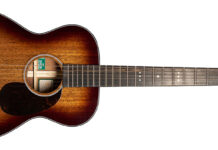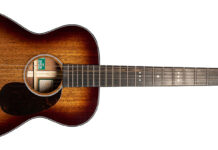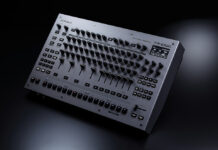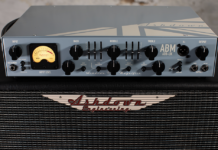Jason Narducy on Verbow, Superchunk, Bob Mould and a Lifetime of Guitar
There are lifers…and then there are lifers. As a pre-teen in the Eighties, guitarist Jason Narducy formed his first punk band Verboten—whom Dave Grohl credits with inspiring him to first start writing songs—and has been a rock lifer ever since.
After some major label success in the Nineties with cello-tinged alt rockers Verbow, Narducy has spent time as a touring bassist for indie rock heroes Bob Mould and Superchunk, among others.
In 2014, he released his first solo album under the name Split Single, Fragmented World, backed by Spoon’s Britt Daniel on bass and Jon Wurster (Mountain Goats, Superchunk) on drums.
Last November, Split Single released Metal Frames, a rawer and more diverse set, featuring Wilco’s John Stirratt on bass. The album serves as a potent distillation of his long career, combining post-punk, churning Nineties rock and Cheap Trick style power-pop mixed with shades of the Who.
Guitar World caught up with Narducy backstage at Portland’s Doug Fir Lounge on February 21 to chat about recording the new Split Single album, the Chicago Cubs and finding time to do everything.
You spent a long time recording the first Split Single album, Fragmented World. Did you take a similar approach with Metal Frames?
I didn’t take time. Much faster record, there was a deadline. I wrote Fragmented World quickly, but recorded it slowly. I was on tour with Bob Mould and Superchunk, and in 2013 I went to Europe three times, Australia twice, many U.S. tours, so recording was put on the backburner.
No one was waiting for the first Split Single record, no one even knew about it, so I had time and I took it. So that record has a lot of focus and a lot of precision, that’s the type of sound I wanted, and [Metal Frames] is just looser, there’s amp noise, there are flubs here and there. We rolled up our sleeves and worked hard, but we didn’t do as much detail work as the last record. I wanted it to be a sonically more muscular record, so I wrote songs that had a little bit more piss and vinegar, and the topics were darker, and it’s more dynamic.
What is your main guitar these days?
I play the Strat Plus from 1996, with the Lace Sensor pickups. I have three of them. For guitar I usually use the Orange AD30TC, which is a really reliable two-channel combo amp. [For bass] those Orange Amps have a lot to do with the sound. SVT’s are reliable rock bass amps, but they carve out a lot of the mids, whereas the Orange Amps naturally have a low mid warmth to them that I really really like. So at every chance I have, if I can use an Orange, that’s my number one pick.
Can you talk about the difference between crowd funding and self-releasing an album versus recording with major label backing?
When I made the first record, I had five labels that I really respected, and I sent the music to them and they all said no. And that stung a little bit, but it forced me to think about how to promote the record. The first thing I came up with was The Sexiest Elbows in Rock Music, and that ended up being huge for people learning about the band. It encouraged me to think of different ways to find my audience.
So whether it’s the two new ones I did of those with the Onion, or the new video for “Untry Love” where the first minute is dialogue and the rest is the music, but it’s a comedic premise. I just wouldn’t have exercised that thought process, I didn’t think about that before. [With crowd funding,] people just like being involved. They’re emailing me and I’m emailing them back, and it opens up this cool dialogue, and that’s where I’m fortunate to not have a million fans, I can write them back. When my ten fans write, I can write them back.
How do you approach playing bass as a touring member, as opposed to being the frontman?
My role with Bob [Mould] and with Superchunk is to be a band member, a team player. I think having played with so many musicians, whether it be with Verbow or any of the other bands I’ve been in, I try to observe the characteristics that I like in other band members.
My goal is to be agreeable and easy to be around and that’s a huge part of the job. There’s a lot of musicians that can play great, but do you wanna spend 24 hours a day with them for weeks on end? So I try to be pleasant to be around.
You own your own painting company in Evanston, Illinois. How do you divide your time between business and family and touring? How do you balance everything?
I also co-own a handyman business, so I have three jobs. Three kids, three jobs, three bands and at one point I said to my wife, ‘I need to remove something because I’m feeling overwhelmed,’ and she said, ‘You’ll just fill it with something else,’ and she’s right, so I’ll just keep doing this. For a couple years I did step away from music, and I was so grumpy that she was kicking me to get back to doing what I enjoy doing.
You’ve lived in the Chicago area for most of your life, are you a Cubs fan?
I’m not a huge baseball fan, but I did get wrapped up in the [World Series] excitement. The morning after they won, Joe [Shanahan] at Metro called me and asked me to put together a band for the Cubs team, because they were having a party at Metro.
So within 24 hours I put together a band, basically for lack of a better word a party band, just playing classic rock stuff. Joe called me and I was his eighth call, I said, ‘First of all, thank you for not making me the number one call for putting together a party band, I don’t want to be that guy.’ But it all came together, and honestly we were honored to play this private party where the whole Cubs organization was there. We played one set, walked over to Wrigley Field, stood on the field while they did fireworks, walked back, did another set. That was pretty amazing.
Source: www.guitarworld.com








